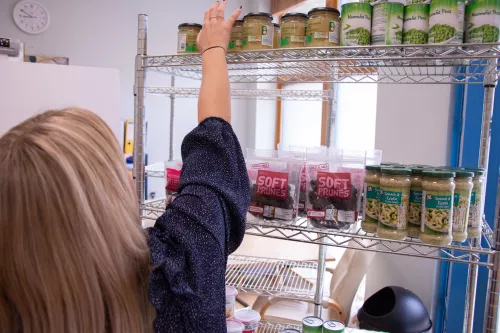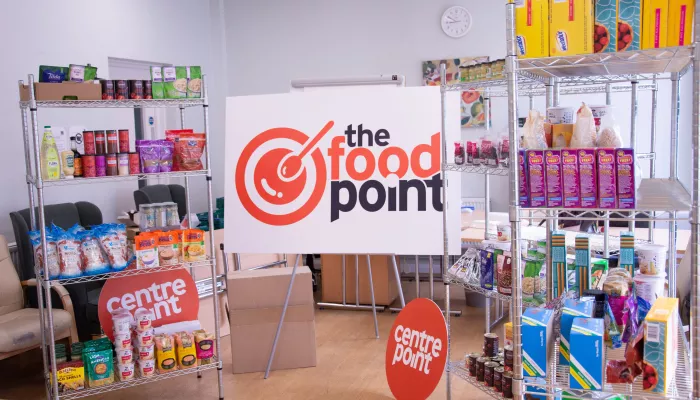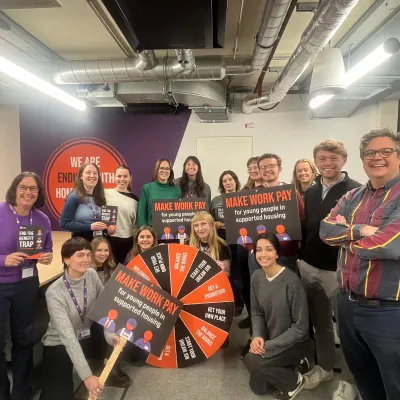Food insecurity is something nearly all young people supported by Centrepoint struggle with. When young people don’t have access to enough affordable, nutritious food, it can lead to poor eating habits. “From a survey we did in 2017, we found out that 60% of people we surveyed in London and the North were skipping meals and going hungry because they didn’t have enough money for food,” says The Food Point’s lead dietitian, Isabel. “Around 40% told us they didn’t know how to cook at all.”
Why a social supermarket?
Without regular food, the body struggles to function properly, which can have repercussions on our performance in education or at our job. Young people at Centrepoint are more likely to have a poor diet, or to have been brought up on an inadequate diet, which puts them at greater risk of nutritional deficiency. This affects their growth and development, as well as mood, immunity and energy levels. Thus, good nutrition is needed to maintain healthy physical and mental wellbeing, which allows young people to reach their potential.
There are, of course, food banks and donations, but these were proving ineffective for young people. So our dietitians decided to change the game: “We partnered with Fareshare, a charity which redistributes surplus food, to find a model that would work,” Isabel explains. That became The Food Point, a social supermarket filled with donated produce, which provides Centrepoint users with simple advice to ensure they can create a nutritious meal out of their shopping.
“We were the first organization to do this as a health intervention,” Isabel continues. “Primarily we were doing it because of food insecurity, but we also wanted to encourage young people to cook more and learn what a balanced diet looks like. We wanted to help develop those life skills around cooking and get them to experiment with new products – you don’t often get the chance to do that if you haven’t got much money.”
How it works
The supermarket is led by Isabel, who walks the shop floor with the young people, supporting them to do a balanced shop, giving nutrition advice and helping with any dietary requirements. They're also provided with food safety information and guidance to help them navigate 'use by' and 'best before' dates, which foods go in the fridge or the freezer, and when foods are no longer safe to eat. Volunteer chef Ben is also on hand to give cooking tips and provide recipes – each session he cooks up some easy but effective recipes: “The food Ben cooks is really nice,” enthuses one Food Point user. “He cooks from different cultures and there’s a good variety. It inspires people to try different things.”
This can help to quell a lot of the confusion and anxiety a lot of homeless young people feel whilst shopping for themselves. “When they leave Centrepoint and find themselves in a supermarket, hopefully naturally they’ll think, ‘I’ll need some fruit and veg, I’ll need this, I’ll need that’. It’s about instilling good habits,” Ben explains. Jack*, Centrepoint resident and regular Food Point volunteer, says helping out at Food Point taught him how to cook: “Before I volunteered, I hardly cooked at all. It’s taught me a lot and I get to chat with them, so it’s good socially. I’ve always found it difficult to talk to people so it’s really helped me in that way – my confidence has improved.”
Trying something new
Combining the expertise of our chefs and dietitians has encouraged plenty of our residents like Jack to take their taste buds out of their comfort zone – under their expert supervision, residents are not just eating more fruit and vegetables, but also enjoying them. “I tried dragon fruit for the first time,” says one female Food Point user. “I really liked it!”
And she’s not the only one – Zoe* has been using The Food Point since moving into Centrepoint accommodation three months ago, and it’s got her cooking far more: “I used to only eat one proper meal a day, now I tend to eat three. It’s definitely got me eating more fruit and veg. I recently tried papaya for the first time, and I never used to like fish, but now I do. It’s encouraged me to take on a healthier lifestyle during my pregnancy,” she says.
Food without financial insecurity
Universal credit is a big problem for many of Centrepoint’s clients. “The long assessment period means that young people can be without any money for several weeks,” Isabel explains. “The system requires you to have computer access, to be really on top of what’s happening. We often see young people get sanctioned, and these sanctions can leave a young person without payments for another four weeks."
Plus, the actual amount that young people receive isn’t much and they often struggle to make ends meet. “How can you budget efficiently when there isn’t enough to pay for bills, food and travel?” Isabel questions. “Young people have told me they’ve been losing weight and skipping meals, and sometimes aren’t able to recall the last time they were able to do a proper food shop because they simply don’t have the money.”
Our relationship to food is intrinsically linked to our mental health, particularly for those who are experiencing food insecurity. For Centrepoint clients, worrying about when their next meal will be has a profound effect on their mental wellbeing. “Getting Universal Credit at the beginning of the month is really difficult. You have to make it last the whole month and midway through, you haven’t got enough money for food,” Jack laments. “I’ve also got dyscalculia [difficulty understanding mathematics], so I have real trouble with numbers and budgeting.”

Stacking the shelves with some of the donations provided by Fareshare
The Food Point aims to give young people the chance to experiment with food, even if they haven’t got much to spend on it. New residents can also use the shop for free for six weeks – this helps to advertise the shop, but also alleviates their worries, particularly as it’s likely their benefits won’t kick in right away.
This is something that has been extremely beneficial to residents. “The first day I moved in here, the staff gave me a free sample of food because I didn’t have anything,” Jack recalls. “I’d just been kicked out of my house I was still trying to attend college and I was going through a lot of things. You get your first few shops for free and that can really help.”
The shop also adapts based on residents’ feedback, including the stock they find in the shop; one resident suggested starting a loyalty card scheme to help people budget better, which has been popular with regular shoppers.
A social space
The supermarket also provides a relaxed social space for young people, with music and activities, and aims to create a positive food environment similar to the atmosphere of a meal with friends or family. “Everyone here is really lovely. The people are so kind and helpful. It’s nice to help out in the kitchen and gain a bit more knowledge about food and cooking,” says Centrepoint resident Michael*.
The Food Point team will sit down with clients for an evening meal: “I enjoy the communication and chat around the table,” says Zoe. “We always talk about interesting things.” Abby*, another young person, said “Thursday is my best day, it feels like a family meal with great company and home-cooked food”.
This has a profound effect on our residents’ social skills. “When sat around the table with young people and volunteers, the residents are noticeably becoming comfortable with conversations around cooking, wellbeing, current affairs, relationships and celebrity culture,” explains Marianne, Healthy Relationships Advisor. “The ability to feel comfortable among new people and welcome those who might be different from themselves is a skill young people can carry into their communities and workplaces.”
Looking back
There’s plenty of great things to celebrate about The Food Point, but if our volunteers had to pick just one from the past year? “The best thing is seeing people come back, which shows it’s needed,” says Ben, who works as a private chef in the City. “Also seeing our young people develop. To start with they can be quite shy, but after a while they open up and we can have a good chat. You can see them taking the nutritional advice on board – sometimes a young person will tell me they cooked a new dish and that’s really great.”
“The scheme is really vital for so many reasons,” says Tessa, another Food Point volunteer. “It addresses the issue that so many young people have, of choosing between buying food and paying for other expenses; it reduces stigma around needing assistance with food expenses; it gives young people a chance to try new foods without great financial risk; it creates a learning environment around food that is open and unforced; and it provides a social space for residents.”
Beyond helping young people with their nutritional needs, Isabel loves building positive relationships with the young people that visit The Food Point: “One resident comes and helps us cook which is really nice, while two others are really good singers and sang for us during one of the meals, which was amazing. Another young man makes his own music and he played us some. You discover things about them that you didn’t know, and that’s always wonderful.”
Want to get involved?
Without the support of volunteers, there would be no Food Point. “I couldn’t run the scheme without the volunteers,” Isabel says. “They are absolutely vital to this project.”
If you’d like to get involved with The Food Point, it’s easy. Just fill out one of our Centrepoint volunteering forms and Isabel will call you for an interview. Centrepoint runs regular training sessions, which you can come along to in order to learn the ropes.
It’s an ideal opportunity for someone who can commit to at least one day a month for a period of six months or over – it’s important for The Food Point to cultivate a friends-and-family style meal environment, and to keep the rota full of familiar faces in order to allow the young people to become comfortable and trusting of volunteers. Once you’ve got the go-ahead, you can become a member of the Centrepoint’s Food Point family.
*Names have been changed







